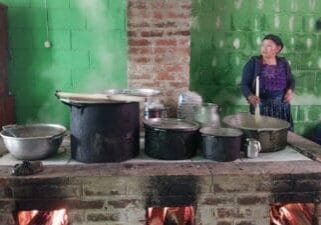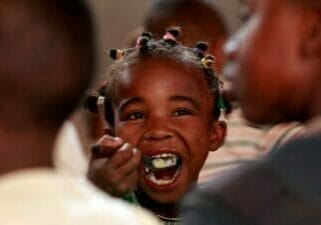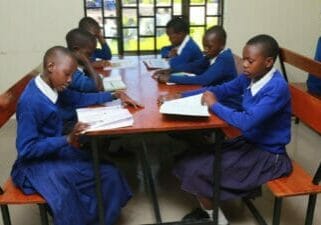News > Blog
The Role of Mianatra in Enhancing School Attendance and Health in Madagascar
Published 05/28/2024 by Global Communities

Until early 2023, EPP Toby Mahatsinjo, a primary school in the chronically food insecure Androy region of Madagascar, faced significant challenges related to water, sanitation and hygiene, nutrition and the overall health of students. The school lacked onsite access to water or latrines, and students were expected to use a shared latrine housed at the local health care center. Every day, teachers and children walked to the Manambovo River to retrieve water to use for handwashing, but it was not safe or clean. According to the school’s principal, Rekory Haveloe, student absences due to illnesses were frequent and very noticeable.
UNICEF France has estimated that 81% of students lack drinking water and 31% have no basic latrines at school in Madagascar.
In one year, enrollment at EPP Toby Mahatsinjo has risen from 466 to over 700 students in attendance daily thanks to significant improvements made through the U.S. Department of Agriculture (USDA)-funded Mianatra project led by Global Communities and implementing partners Catholic Relief Services and FHI 360.
Mianatra (“Learn” in Malagasy) is the first McGovern-Dole International Food for Education and Child Nutrition project in Madagascar, and it began its intervention at EPP Toby Mahatsinjo in February 2023 by working to improve literacy and education, serve daily nutritious meals, increase access to drinking water and sanitation services, and provide resources for preventive healthcare.
Since its inception, the program’s new water, sanitation and hygiene (WASH) activities have transformed the school environment. To address ongoing WASH challenges, the project facilitated a piped water connection between the school and JIRAMA, the national electricity and water network. It also constructed three handwashing devices, provided WASH awareness materials, and provided a water filter, soap and water treatment solution to prevent waterborne illnesses.

Principal Rekory Haveloe stands in front of a newly constructed handwashing station.

Students now have better health and hygiene conditions. Not only do they know the key moments for handwashing, but they also apply them and can spread the word because the school now has all the materials, tools and resources needed to make it possible,” shares Principal Haveloe.
These improvements have led to a steady increase in the average attendance rate of students, which now ranges daily from 88% – 94%, compared to less than 60% at the start of the project. Teachers have also shared their motivation to show for their students, with an average monthly attendance rate of over 90%, the highest of all Mianatra implementation schools.
Mianatra has also provided technical assistance and material support in the construction of latrines, rehabilitation of a local water point, teacher trainings to communicate the importance of a WASH-friendly school approach and led the creation of WASH clubs for over 200 students to promote important WASH messages.
Holistic programs like Mianatra are so powerful because they not only support the whole child, but the family and community behind them.
Principal Haveloe explains that providing access to water allows the school to water its own gardens and creates a sustainable income opportunity for the school to supply this precious resource to surrounding communities. They can then use the funds to pay the water bill and perform maintenance and repairs on the water point.
“The proximity of the water point has enabled us to implement school feeding on time and regularly maintain the school garden, which allows us to produce fresh vegetables for dietary diversification.”
Intestinal parasitic infections are commonly spread in areas where access to clean water is limited and have been a regular occurrence for children at EPP Toby Mahatsinjo. Once water points had been provided to the school, the Mianatra project team conducted deworming and iron supplementation campaigns to improve children’s overall health and support an improved learning environment for children.
Through the Mianatra project, public and private partners, communities and households are now mobilized to engage in resilient and sustainable activities to ensure that students in the region have access to better education, health, hygiene and nutrition,” said Philippe LeMay, Chief of Party for Mianatra.
Mianatra is implemented in close collaboration with the Government of Madagascar and local communities. Over five years, Mianatra will provide 4,020 metric tons of U.S. donated commodities as well as funds to procure 1,753 metric tons of locally grown and purchased food to provide daily school meals to an estimated 51,710 preschool and primary school students in 150 schools in Southern Madagascar.





